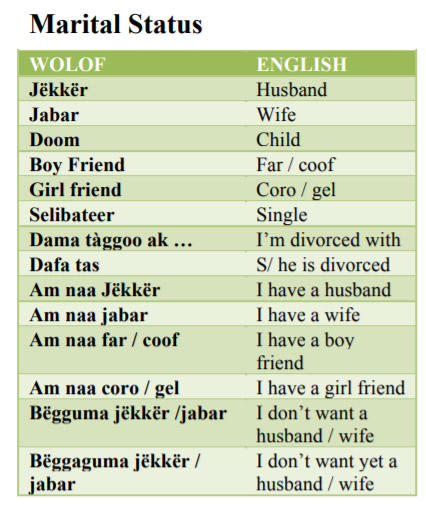Language/Wolof/Vocabulary/Marital-Status
< Language | Wolof | Vocabulary
Jump to navigation
Jump to search
Rate this lesson:
Wolof is a language spoken by people in Senegal, The Gambia, and Mauritania. Marriage and family are highly valued in Wolof culture and people are expected to follow traditional gender roles. Marital status can also affect a person's social status and what they are able to do in their community.
Don't hesitate to look into these other pages after completing this lesson: Wolof survival phrases, Weather, Basic Greetings & Body.
Marital Status in Wolof[edit | edit source]
Practice Phrases[edit | edit source]
- Am nga jëkkër / jabar? Do you have a husband/ wife?
- Déedéet, amuma jëkkër / jabar. No, I don’t have a husband / wife.
- Déedéet, amaguma jëkkër / jabar No, I don’t have yet a husband / wife.
- Selibateer laa. I am single.
- Samay waajur dañu tàggoo / tas My parents are divorced
- Xanaa bëggoo jëkkër? Don’t you want a husband?
- Bëgguma jëkkër leegi? I don’t want a husband now.
- Am naa far ci Amerik. I have a boyfriend in America.
Source[edit | edit source]
http://publish.illinois.edu/wolof201fall14/files/2014/08/NEW_WOLOF_BOOK.pdf
Other Lessons[edit | edit source]
- Colors
- Clothes
- Weather
- Asking and saying the age
- Fruits
- Useful Interjections
- Numbers
- Verbs
- Count to 10


